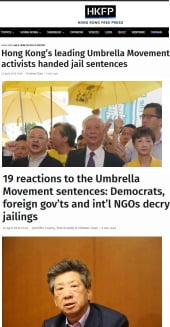A few non-custodial sentences and several prison spells of below two years. The punishments handed out to the Occupy 9 look so finely calibrated, it’s uncanny.
If you consider the fact that the accused hadn’t done anything wrong by Hong Kong’s old (pre-2014) ‘1 Country 2 Systems’ standards, the charges, trial and sentences are an outrage. But if you buy the story that the defendants caused citywide chaos and misery, the penalties could be described as ‘lenient’.
It’s as if an invisible scriptwriter (or maybe committee), after much agonizing, had crafted this as the optimum plot formula. It meets Beijing officials’ demands that evil conspirators who challenge the state are seen to suffer, but it shouldn’t visibly shock international opinion (happily snoozing through a few dozen Saudi beheadings) or overly damage Hong Kong’s reputation.
Things could still upset this careful balance. Beijing’s Liaison Office apparatchiks – no fans of what shoe-shiners call the ‘healing process’ – might be hugely miffed that the chickens haven’t been killed bloodily enough to sufficiently scare the monkeys. They will then order the government to appeal for harsher sentences, reminding everyone that these are Chinese Communist Party thugs we’re talking about, and leaving our officials looking more than ever like pitiful puppets and quislings. And, of course, the Occupy 9 could appeal to higher courts where, many like to believe, judges are less inclined to swallow government prosecutors’ politically-driven arguments.
Whatever happens, the drawn-out and desperate pursuit of even mild-mannered, moderate idealists like Benny Tai and his buddies should clarify what has changed in Hong Kong in recent years – in case anyone hasn’t already realized.
The main difference between pre- and post-2014 Hong Kong is that the CCP has started to extend its traditional method of rule by fear onto this side of the border. Previously, people organized protests, jeered the national anthem or published salacious political books secure in the knowledge that they would not face the ‘midnight knock at the door’. They could feel free. Now they can’t.

